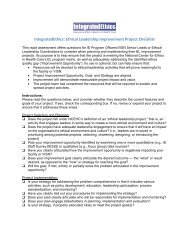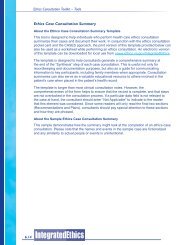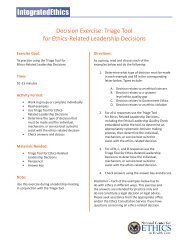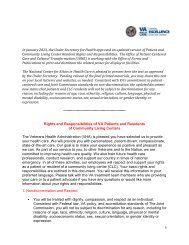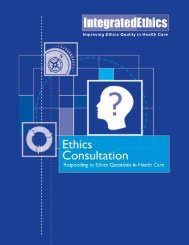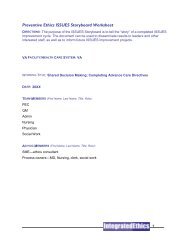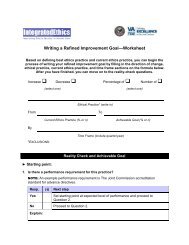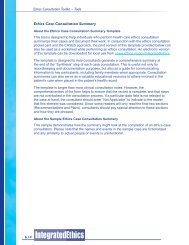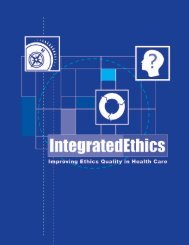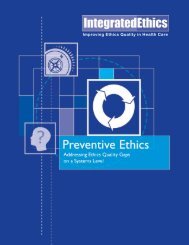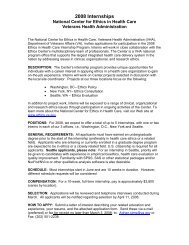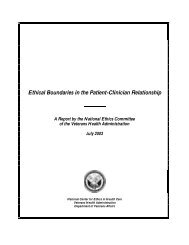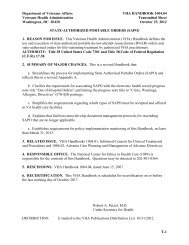Ethical Leadership Toolkit - National Center for Ethics in Health ...
Ethical Leadership Toolkit - National Center for Ethics in Health ...
Ethical Leadership Toolkit - National Center for Ethics in Health ...
You also want an ePaper? Increase the reach of your titles
YUMPU automatically turns print PDFs into web optimized ePapers that Google loves.
<strong>Ethical</strong> <strong>Leadership</strong> <strong>Toolkit</strong> – Communications Materials<br />
Integrated<strong>Ethics</strong>: Clos<strong>in</strong>g the <strong>Ethics</strong> Quality Gap<br />
VA: A Leader <strong>in</strong> Quality<br />
VA has been <strong>in</strong>creas<strong>in</strong>gly<br />
recognized as a leader <strong>in</strong> quality<br />
health care. In 2004 the <strong>National</strong><br />
Committee <strong>for</strong> Quality Assurance<br />
(NCQA) found that the VA system<br />
outper<strong>for</strong>med all other hospitals<br />
on each of its 17 quality measures.<br />
Today, such publications as<br />
Bus<strong>in</strong>ess Week, The New York<br />
Times, and U.S. News & World<br />
Report all describe VA health care<br />
as the best <strong>in</strong> the country. How<br />
has this enormous and unwieldy<br />
system with f<strong>in</strong>ite resources and an<br />
ag<strong>in</strong>g patient population managed<br />
to take the lead <strong>in</strong> health care<br />
quality In part through visionary<br />
and committed leaders and staff<br />
who have developed standardized,<br />
<strong>in</strong>novative approaches to quality<br />
improvement. One example of that<br />
vision has been VA’s <strong>in</strong>tegrated<br />
health <strong>in</strong><strong>for</strong>mation system, <strong>for</strong><br />
which the Agency received<br />
Harvard University’s “Innovations<br />
<strong>in</strong> American Government<br />
Award.” The Institute of<br />
Medic<strong>in</strong>e acknowledges that VA’s<br />
“<strong>in</strong>tegrated health <strong>in</strong><strong>for</strong>mation<br />
system, <strong>in</strong>clud<strong>in</strong>g its framework<br />
<strong>for</strong> us<strong>in</strong>g per<strong>for</strong>mance measures to<br />
improve quality is . . . one of the<br />
best <strong>in</strong> the nation.”<br />
Improv<strong>in</strong>g Quality <strong>in</strong><br />
<strong>Ethics</strong><br />
Today, almost every health<br />
care <strong>in</strong>stitution <strong>in</strong> the United<br />
States has some mechanism <strong>for</strong><br />
address<strong>in</strong>g the difficult ethical<br />
issues that arise <strong>in</strong> patient care.<br />
But the same pressures that have<br />
prompted changes <strong>in</strong> quality<br />
and patient safety—tighten<strong>in</strong>g<br />
resources, more complex care<br />
delivery systems, older and sicker<br />
patients—also create new ethical<br />
challenges. Can traditional ethics<br />
programs respond adequately<br />
to this shift Not accord<strong>in</strong>g to<br />
Arthur Caplan, PhD, director<br />
of the <strong>Center</strong> <strong>for</strong> Bioethics at<br />
the University of Pennsylvania:<br />
“The traditional ethics committee<br />
model is reactive—too often it<br />
deals primarily with questions<br />
about end-of-life care <strong>in</strong> <strong>in</strong>dividual<br />
cases. In the current environment,<br />
ethics has to be proactive, ready<br />
to address a broad set of issues<br />
across a lifespan, and to do it with<br />
<strong>in</strong>creas<strong>in</strong>g resource constra<strong>in</strong>ts.”<br />
Frontl<strong>in</strong>e health care professionals,<br />
too, see a need <strong>for</strong> change. Gwen<br />
Gillespie, advanced practice nurse<br />
and ethics committee chair at the<br />
VA Medical <strong>Center</strong> <strong>in</strong> C<strong>in</strong>c<strong>in</strong>nati,<br />
Ohio, puts it this way: “Our staff<br />
is committed to ethical practices,<br />
but we could def<strong>in</strong>itely use some<br />
help. <strong>Health</strong> care is rapidly<br />
chang<strong>in</strong>g, <strong>for</strong> example, <strong>in</strong> the area<br />
of organizational ethics. Our ethics<br />
committee needs to change as<br />
well.”<br />
VA leaders likewise realize that<br />
“gett<strong>in</strong>g to green” on per<strong>for</strong>mance<br />
measures isn’t enough. They want<br />
a comprehensive approach to<br />
quality that keeps ethics <strong>in</strong> balance<br />
with other priorities. “Success<br />
<strong>in</strong> deliver<strong>in</strong>g high-quality, costeffective<br />
health care can’t come at<br />
the expense of our other values,”<br />
says L<strong>in</strong>da Belton, director of<br />
VISN 11 <strong>in</strong> Ann Arbor. “<strong>Ethical</strong><br />
concerns have to be part of our<br />
everyday decision mak<strong>in</strong>g and we<br />
must take proactive, coord<strong>in</strong>ated<br />
steps to identify and address ethical<br />
concerns.”<br />
As the largest health care system <strong>in</strong><br />
the United States, and a recognized<br />
leader <strong>in</strong> health care quality, VA is a<br />
natural laboratory <strong>for</strong> develop<strong>in</strong>g an<br />
<strong>in</strong>novative, systems-focused model<br />
to promote and improve ethical<br />
practices <strong>in</strong> health care.<br />
An <strong>Ethics</strong> Quality Gap<br />
As a first step, VA’s <strong>National</strong> <strong>Center</strong><br />
<strong>for</strong> <strong>Ethics</strong> <strong>in</strong> <strong>Health</strong> Care has<br />
collected data on the VA system to<br />
understand where there are gaps, or<br />
“opportunities <strong>for</strong> improvement.”<br />
What did they f<strong>in</strong>d<br />
• VA employees th<strong>in</strong>k about<br />
ethics every day, and want<br />
additional educational<br />
resources and support to do<br />
their jobs better.<br />
• <strong>Ethics</strong> programs across<br />
VA vary considerably <strong>in</strong><br />
terms of their quality and<br />
effectiveness.<br />
• <strong>Ethics</strong> programs often<br />
operate as “silos” <strong>in</strong>stead of<br />
be<strong>in</strong>g well <strong>in</strong>tegrated <strong>in</strong>to<br />
the organization’s structure<br />
and hierarchy.<br />
• Despite significant<br />
<strong>in</strong>vestments <strong>in</strong> staff<br />
time, few VA health<br />
care facilities rigorously<br />
evaluate the quality or<br />
effectiveness of their ethics<br />
activities.<br />
These challenges are hardly<br />
unique to VA—they are typical of<br />
hospitals <strong>in</strong> the private sector.<br />
A <strong>National</strong> Consensus<br />
On a national level, a consensus<br />
is emerg<strong>in</strong>g about the need <strong>for</strong> a<br />
more systematic approach. Arthur<br />
Derse, MD, JD, chair of VHA’s<br />
<strong>National</strong> <strong>Ethics</strong> Committee,<br />
director <strong>for</strong> Medical and Legal<br />
Affairs at the <strong>Center</strong> <strong>for</strong> the<br />
Study of Bioethics at the Medical<br />
College of Wiscons<strong>in</strong>, and <strong>for</strong>mer<br />
president of the American Society<br />
<strong>for</strong> Bioethics and Humanities,<br />
calls <strong>for</strong> the development of<br />
tools that can be widely adopted:<br />
“Constra<strong>in</strong>ed resources mean<br />
we’re limited <strong>in</strong> what we can do<br />
<strong>for</strong> patients. There<strong>for</strong>e we need<br />
tools that create efficiencies<br />
of scale—policies, manuals,<br />
guidance on ethics consultation<br />
and how to handle difficult issues<br />
at a systems level—to alleviate the<br />
pressure on <strong>in</strong>dividual facilities to<br />
resolve these problems.” Matthew<br />
Wynia, MD, MPH, director of<br />
the Institute <strong>for</strong> <strong>Ethics</strong> at the<br />
American Medical Association,<br />
advocates apply<strong>in</strong>g pr<strong>in</strong>ciples of<br />
cont<strong>in</strong>uous quality improvement:<br />
“A systems approach holds a great<br />
deal of promise <strong>for</strong> improv<strong>in</strong>g the<br />
ethical culture of organizations.<br />
It’s built on strong assumptions<br />
about organizations, that they<br />
are constantly <strong>in</strong> evolution, and<br />
amenable to change.” Margaret<br />
O’Kane, president of NCQA,<br />
4.5



